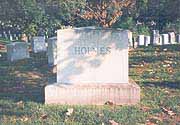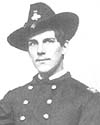At times the ambitious ends of life have made it seem to me lonely, but it has not been. I have the companionship of dear friends who have helped to keep alive the fire in my heart. If I could think that I had sent a spark to those who come after I should be ready to say Goodbye.

We cannot live our dreams. We are lucky enough if we can give a sample of our best, and if in our hearts we can feel that it has been nobly done.

The end of life is life. Life is action, the use of one's powers. And to use them to their height is our joy and duty, so it is the one end that justifies itself...more complex and intense intellectual efforts mean a fuller and richer life. They mean more life. Life is an end in itself, and the only question as to whether it is worth living is whether you have enough of it....

Life is a roar of bargain and battle, but in the very heart of it there rises a mystic spiritual tone that gives meaning to the whole. It transmutes the dull details into romance. It reminds us that our only but wholly adequate significance is as parts of the unimaginable whole. It suggests that even while we think that we are egotists we are living to ends outside ourselves.

No man has earned the right to intellectual ambition until he has learned to lay his course by a star which he has never seen—to dig by the divining rod for springs which he may never reach.... Make your study heroic, for to think great thoughts you must be heroes as well as idealists. Only when you have worked alone—when you have felt around you a black gulf of solitude more isolating than that which surrounds the dying man, and in hope and in despair have trusted to your own unshaken will—then only will you have achieved...

It seems to me that the rule for serving our fellow men, and, so far as we may speculate our hope upon that awful theme, the rule for fulfilling the mysterious ends of the universe—that beginning of self-sacrifice and of holiness—is to do one's task with one's might. If we do that, I think we find that our motives take care of themselves. We find that what may have been begun as a means becomes an end in itself; that self-seeking is forgotten in labors which are the best contribution that we can make to mankind; that our personality is swallowed up in working to ends outside ourselves.
Special thanks to Brian Pohanka for providing the quotations on this page.
See Memorial Day for Oliver Wendell Holmes's 1884 address at Keene, N.H., to veterans of John Sedgwick Post No.4, Grand Army of the Republic.

  Born in Boston in 1841, Oliver
Wendell Holmes was named after his father, the physician
and writer. Holmes graduated from Harvard College, then
enlisted as with the 20th
Massachusetts Infantry, better known as the "Harvard
Regiment." Thrice wounded in the line of duty,
Holmes served in the regiment as Lieutenant, Captain and Brevet Colonel, then as
aide-de-camp on the staff of General Horatio Wright of
the Sixth Corps. Following the war, Holmes practiced law
in Boston and was a lecturer on common law at the Lowell
Institute in Boston. As a member of the Massachusetts
Supreme Court, Holmes was an associate justice, then
chief justice. He served as associate justice of the U.S.
Supreme Court from 1902 through 1932. Holmes passed away
in 1935; his resting place is at Arlington National
Cemetery in Virginia. Born in Boston in 1841, Oliver
Wendell Holmes was named after his father, the physician
and writer. Holmes graduated from Harvard College, then
enlisted as with the 20th
Massachusetts Infantry, better known as the "Harvard
Regiment." Thrice wounded in the line of duty,
Holmes served in the regiment as Lieutenant, Captain and Brevet Colonel, then as
aide-de-camp on the staff of General Horatio Wright of
the Sixth Corps. Following the war, Holmes practiced law
in Boston and was a lecturer on common law at the Lowell
Institute in Boston. As a member of the Massachusetts
Supreme Court, Holmes was an associate justice, then
chief justice. He served as associate justice of the U.S.
Supreme Court from 1902 through 1932. Holmes passed away
in 1935; his resting place is at Arlington National
Cemetery in Virginia.
Black
and white images of Holmes courtesy of Brian Pohanka.
Photo of Holmes's gravesite by DLO.
|